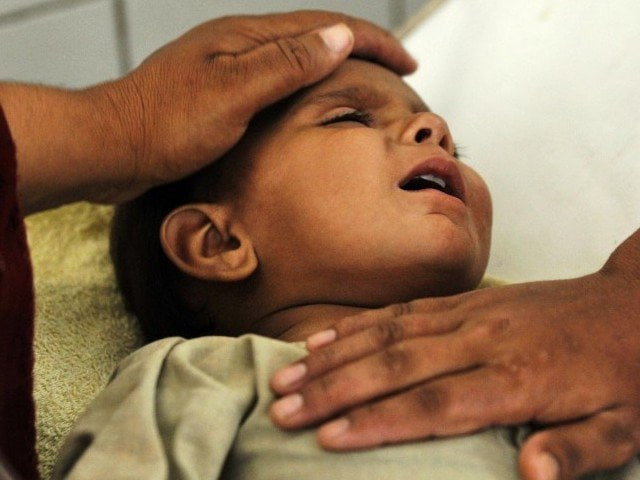Epidemics break out in city
Malaria, dengue increasing at alarming speed

The monsoon rains have brought in their wake a host of water-borne diseases, such as cholera, typhoid, and diarrhea, while stagnant rainwater mixed with sewage in different areas of the city has become breeding grounds of mosquitos that cause ailments like dengue and malaria.
Piles of stinking garbage and rotting entrails of sacrificial animals have become ugly sights in several localities where an unbearably foul smell is also causing respiratory problems among residents.
The Sindh Health Department has recorded a huge increase in the number of patients suffering from diseases like dengue, malaria, diarrhea and cholera. More than 1,345 cases of dengue have been reported in the province so far this year, according to official statistics. Of them, more than 1,049 cases have been in Karachi alone.
At least 20 to 25 dengue cases are being reported on a daily basis in the Civil Hospital Karachi, which is the largest government hospital in the province working under the supervision of Provincial Health Department. The Jinnah Hospital is also receiving 15 to 20 dengue cases daily.
More than 15,152 cases of malaria have been reported in Sindh so far this year. Out of these, more than 98 cases have been from Karachi. Fifteen to twenty cases of malaria are being reported on a daily basis in the Civil Hospital and 10 to 15 cases in the Jinnah Hospital. So far this month, one malaria case has been reported in the Sindh Government Hospital Liaquatabad.
More than 414 cases of cholera have been reported in Sindh so far this year. The Civil Hospital is reporting 4 to 5 cases daily, while the number of patients visiting the Jinnah Hospital daily is 8 to 10. Since March this year, the Health Department has recorded more than 229,591 cases of diarrhea among children aged less than 5 years, and more than 264,940 cases among people above 5 years of age.
During the same time period, the number of dysentery cases among children below 5 years of age has been more than 25,927, while among people above 5 years of age the number of cases has been 34,991.
Thirty to thirty-five diarrhea cases are being reported at the Civil Hospital on a daily basis, while the Jinnah Hospital treats 20 to 25 diarrhea patients daily. At the Sindh Government Hospital, 12 adults have been treated for diarrhea symptoms so far this year, while the number of children treated here for the same disease has reached 350.
Dr. Umar Sultan, General Physician at Jinnah Hospital, told The Express Tribune that epidemics like, dengue, malaria, cholera, and diarrhea have been on the rise due to stagnant rainwater and non-disposal of offals of sacrificial animals after Eid-ul-Azha.
Around 48 cases of diarrhea were reported at Jinnah Hospital on the first day of Eid and then 50 to 55 patients with diarrhea symptoms started visiting the hospital on a daily basis, he said. He went on to add that these diseases could easily be prevented by improving personal hygiene.
Dr. Sultan said that dengue and malaria are caused by mosquito bite, while typhoid, diarrhea and cholera are water-borne diseases which are caused by consumption of contaminated water and substandard food. “Dengue-carrying mosquito breeds in clean water, while malaria-causing mosquito germinates in polluted water,” he added.
Dr. Sultan advised people to use mosquito nets or insect-repellents to keep mosquitos at bay and cover water containers at homes. He also advised people to boil water before drinking and avoid consuming old or stored food.
Published in The Express Tribune, August 9th, 2022.



















COMMENTS
Comments are moderated and generally will be posted if they are on-topic and not abusive.
For more information, please see our Comments FAQ